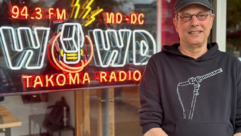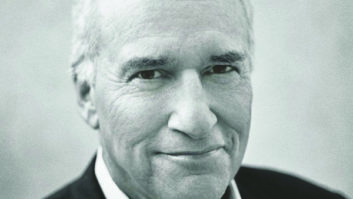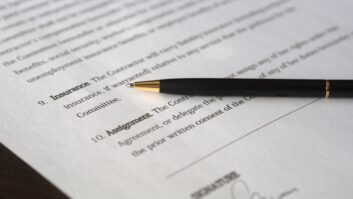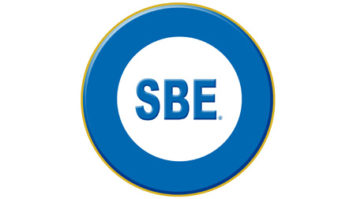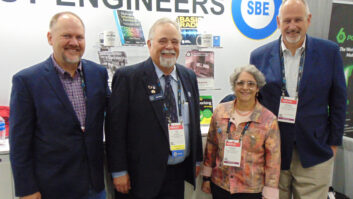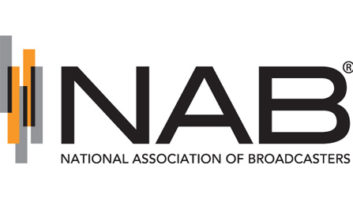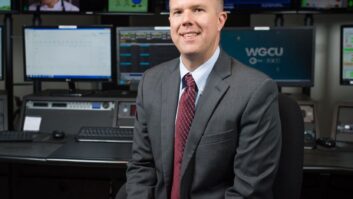Join Hands, Hams
I was very pleased with the feature on the “Hamvention” in the Aug. 1 edition. I am a retired broadcast engineer (40 years in the “biz” as engineer and talent) and a recent ham and ARRL member. The ham community has some fantastic talent, and attracts the kind of people we need in broadcasting.
There are many bright young people who already have experience in AM, FM, satellite and yes digital communication plus many other skills.
While the equipment is somewhat different, and the “on the air” methods and goals differ as well, the bottom line is that the technology is not that removed from broadcasting. Oriented hams know microphones and antennas, design their own gear and operate with integrity. They follow the rules and understand both new and old technology.
Today’s amateur radio operators do far more than just talk on the radio, too. Digital messaging, computers, electronic logging and emergency management — the list goes on. Learning the broadcast side is not a giant step, and you have technical talent that not only can handle IT, but knows a lot about transmitters, antennas and the rest of the old world stuff.
Take a look at the amateur General and Extra Class tests if you want to see some good electronics training, rules and regulations, and discipline. We should join hands and encourage the younger hams to explore broadcasting and we all will benefit.
Dan Thomas
Retired Broadcast Engineer
Weatogue, Conn.
AM Is Dead
Leslie, AM IBOC will never be implemented past the point that it is now (“All-Digital AM Tests Considered,” Aug. 15). Absolutely no one is listening to AM, let alone AM IBOC. The broadcast business had a chance to implement an inexpensive, but very effective system (DRM) but they chose to get in bed with the devil (Bain Capital/Clear Channel/CBS).
So what we have now is a huge mess, and receiver manufacturers know it. They know that IBOC was a mistake; that’s why there are no receivers. By the time there are enough IBOC AM and FM receivers available to the public, terrestrial radio will be all but completely dead.
Sorry, but this is the reality of the situation.
Through Microsoft Sync, I am now streaming stereo Bluetooth audio from my smartphone in my car, and it’s not bad. Streaming audio in a vehicle is rather new, but in five years, everyone will have it. Then what?
I’ll tell you what: No more traditional radio. There may be a few large market stations left, but most will simply go out of business, because the revenue stream will be so low, there won’t be enough cash to operate transmitters. Even fully automated operations will be in big trouble. Sort of a “Catch-22.”
If the industry had stood up to the IBOC proponents and rejected the IBOC mess and adopted DRM and DRM+, we would be facing a completely different situation out there now. But they didn’t. So now they have to pay for their mistake
In summary, having ridiculous arguments about hybrid digital radio is a waste of time. The system is already obsolete and in five years radio will be too.
Sorry, but you’d better find a new gig!
Gary Saber
President
GBS Consultants Inc.
Raleigh, N.C.
Kahn Helped Young Engineers

Leonard Kahn is in white at left, with his engineers Robert R. ‘Bob’ Gordon in red and Ira M. Salzman in blue.
Re “Leonard Kahn Was an AM Advocate,” Sept. 1 issue:
The year was 1984. At 18 years old and just barely out of high school, I found myself in the chief engineering position at KKSN(AM) in Portland, Ore. Formerly the legendary “Boss” radio station, KISN(AM), the station had been revived only five years prior to my arrival after being dark for several years.
I arrived to find an old facility with an almost-new Collins Power Rock transmitter and a Kahn AM stereo generator. Back in those days, KKSN(AM) was broadcasting in a commercial classical format, a brave thing to do on AM.
Much work had been done to broadband the directional array and make way for a better signal, but in spite of having a new console, Optimod and transmitter, there was always a dirty quality about the station’s audio. No matter how carefully I calibrated the air chain to include Kahn’s stereo generator, I couldn’t make it sound clean.
I found that bypassing the stereo generator cleaned up the audio. I called Leonard Kahn and he was very gracious, telling me that a new card was on the way and I was not to adjust anything. Just plug it in and send an aircheck.
I installed the new card and the sound was so astonishing that I nearly fell over! After making some tweaks to the Optimod, I sent a “before and after” aircheck. About a week later, Kahn called me and said, “My God! What did you do? That’s the best sounding AM stereo aircheck I’ve ever heard!” He liked it so much that he wanted to use it as part of a demo tape.
In time, I moved on to other stations and AM stereo fell out of favor; but I’ll always remember the passion that Leonard Kahn had for AM stereo and his willingness to help a young engineer make the station sound great.
Michael Graves
TV Engineer
KOVR(TV)/KMAX(TV)
Sacramento, Calif.




